中考六大时态复习
图片预览
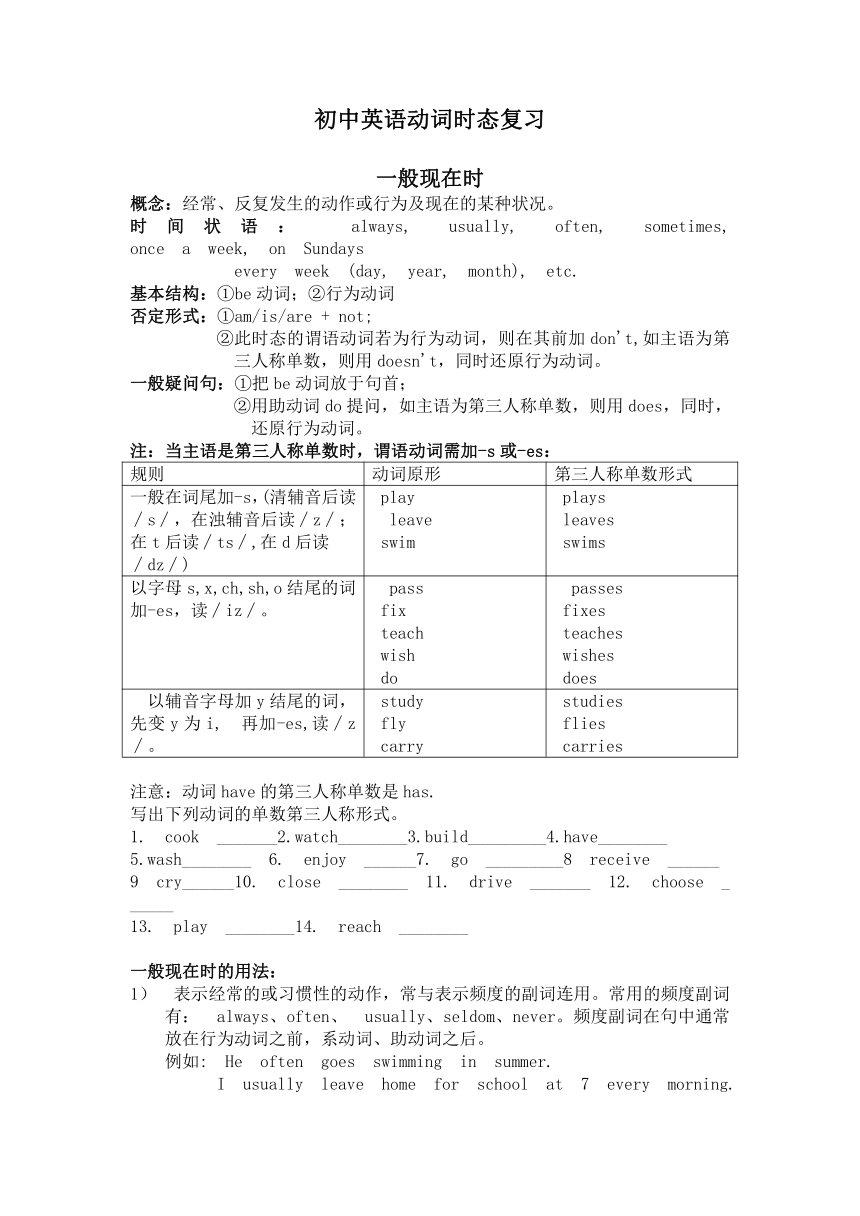
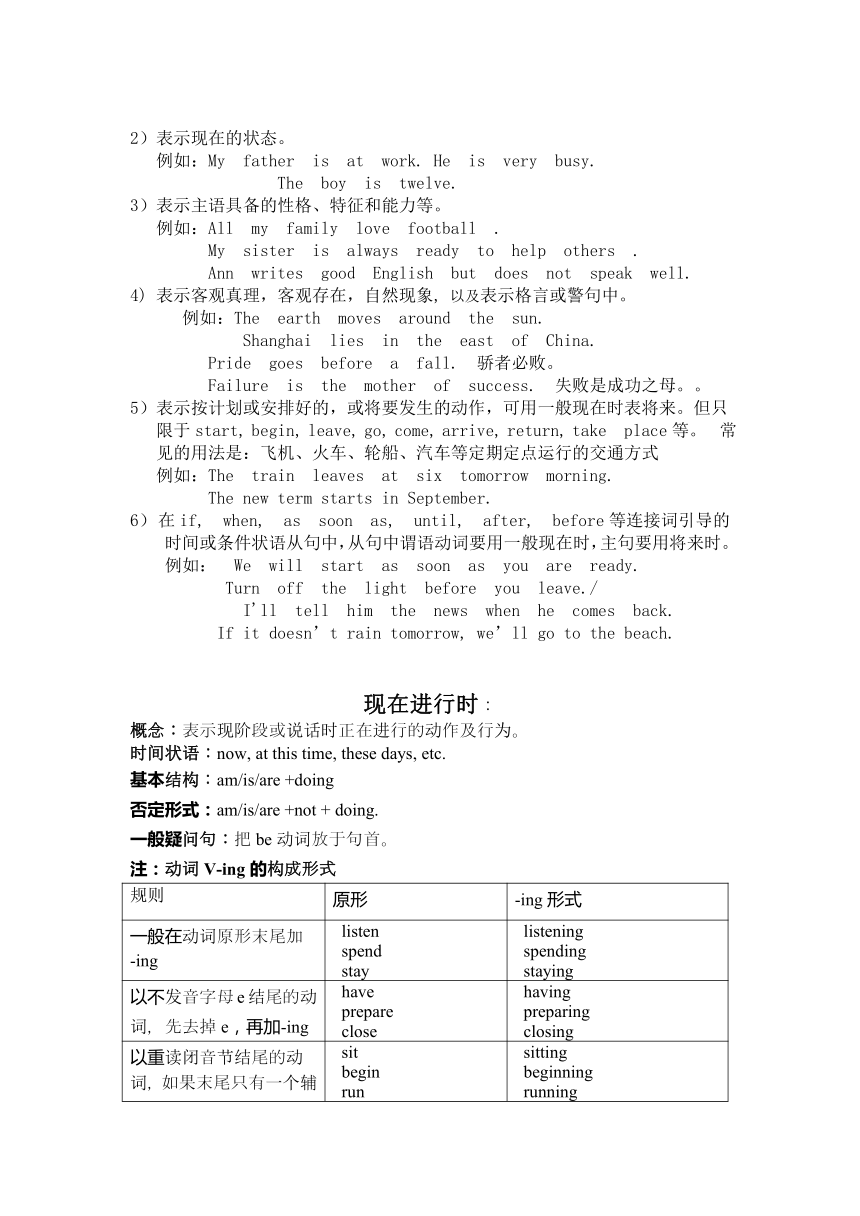
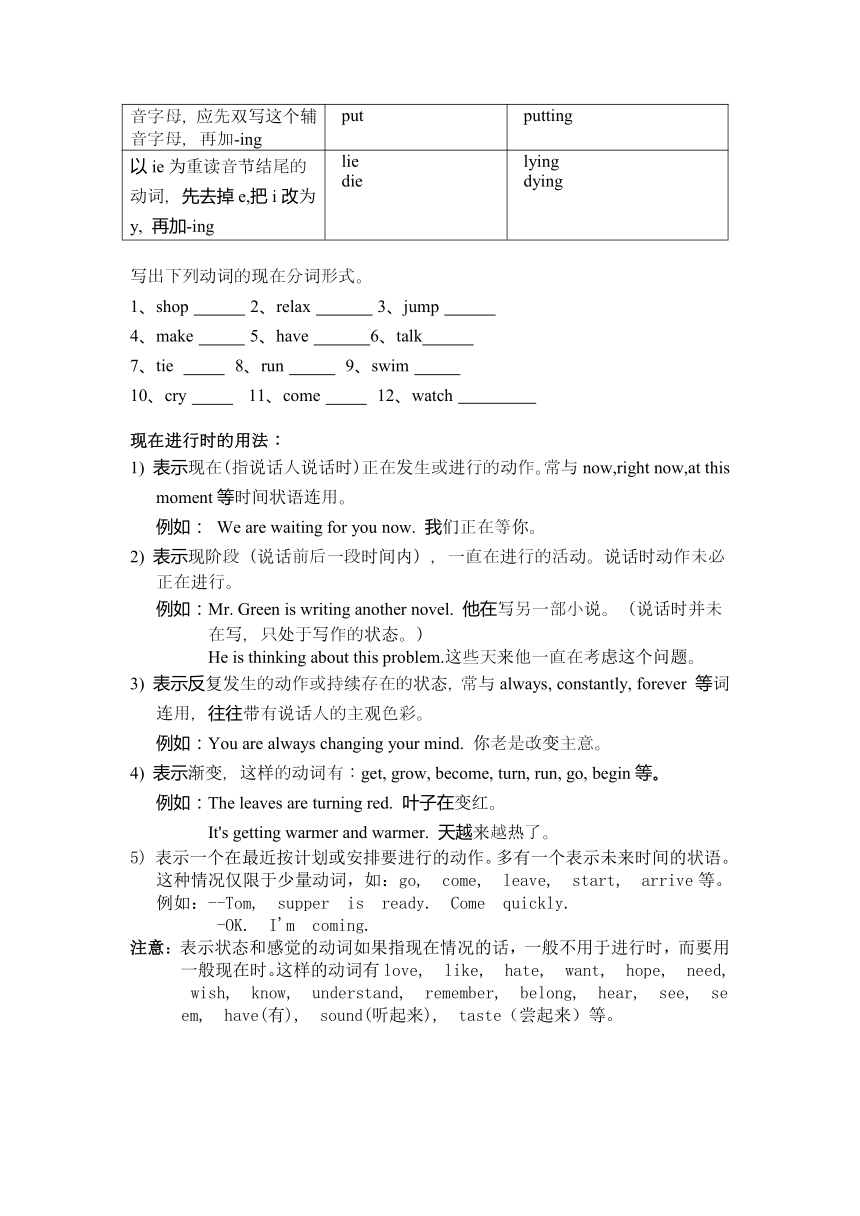
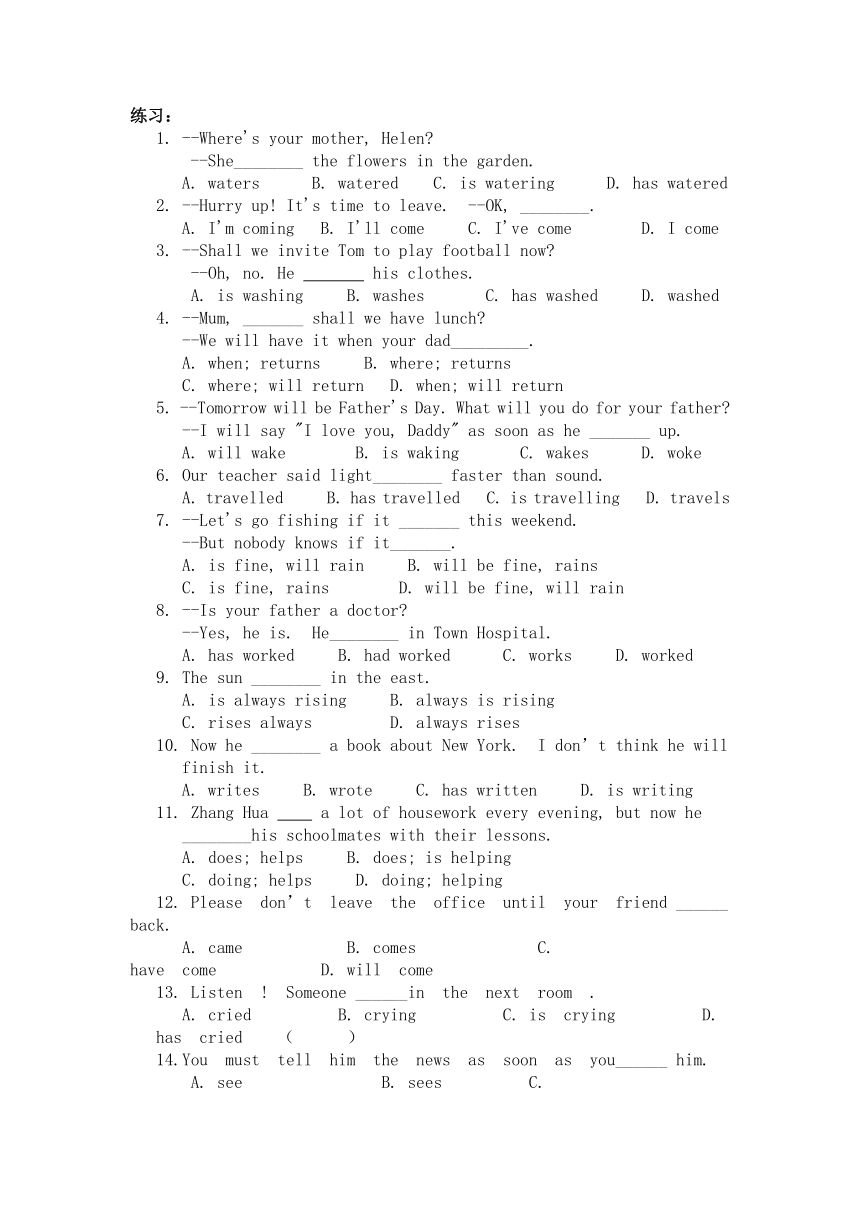
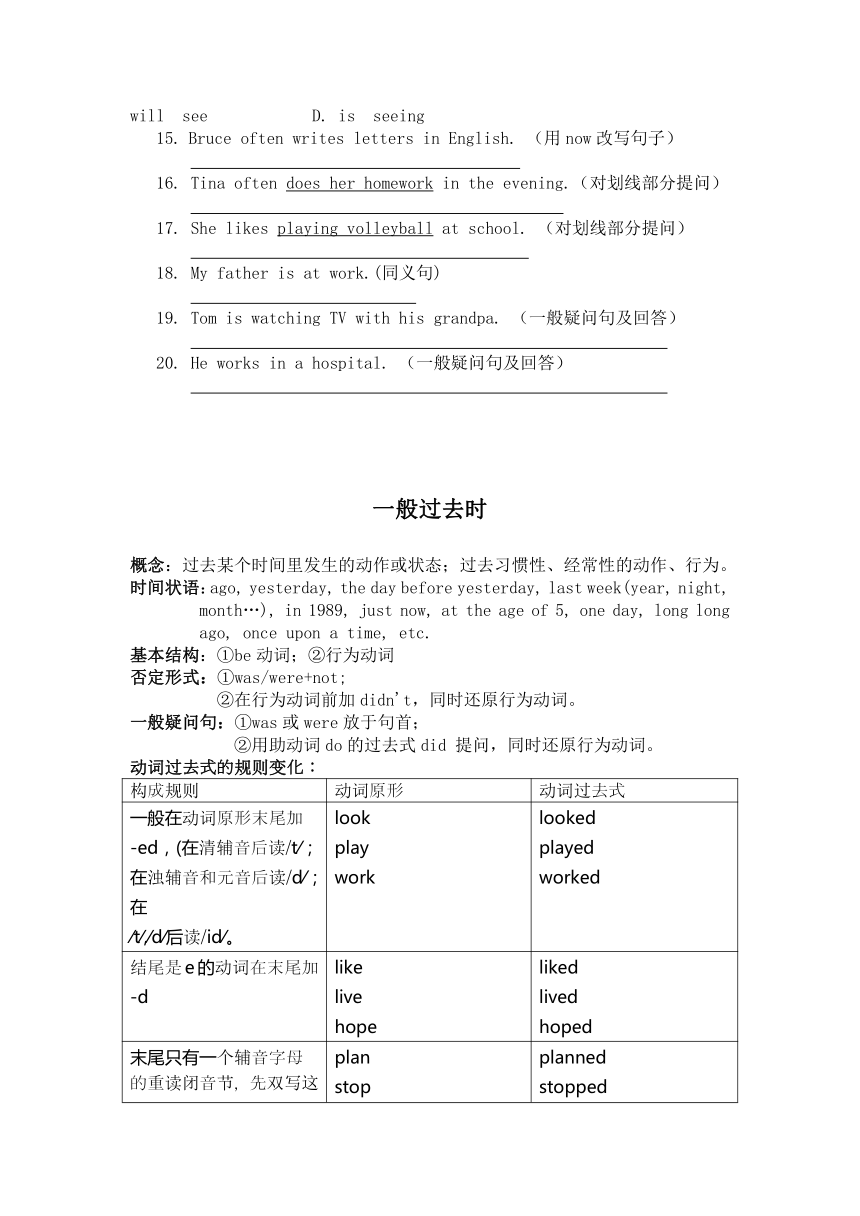
文档简介
初中英语动词时态复习
一般现在时
概念:经常、反复发生的动作或行为及现在的某种状况。?
时间状语:?always,?usually,?often,?sometimes, once?a?week,?on?Sundays
? every?week?(day,?year,?month),?etc.?
基本结构:①be动词;②行为动词?
否定形式:①am/is/are + not;
②此时态的谓语动词若为行为动词,则在其前加don't,如主语为第三人称单数,则用doesn't,同时还原行为动词。?
一般疑问句:①把be动词放于句首;
②用助动词do提问,如主语为第三人称单数,则用does,同时,还原行为动词。??
注:当主语是第三人称单数时,谓语动词需加-s或-es:?
规则
动词原形?
第三人称单数形式?
一般在词尾加-s,(清辅音后读∕s∕,在浊辅音后读∕z∕;在t后读∕ts∕,在d后读
∕dz∕)?
play
?leave?
swim?
plays??
leaves
swims
以字母s,x,ch,sh,o结尾的词加-es,读∕iz∕。
?pass???
fix
teach
wish
do
?passes???
fixes
teaches??
wishes
does
?以辅音字母加y结尾的词,先变y为i,?再加-es,读∕z∕。
study??
fly?
carry
studies?
flies
carries?
注意:动词have的第三人称单数是has.?
写出下列动词的单数第三人称形式。?
1.?cook?_______2.watch________3.build_________4.have________
5.wash________?6.?enjoy?______7.?go?_________8?receive?______
9?cry______10.?close?________?11.?drive?_______?12.?choose?______
13.?play?________14.?reach?________?
一般现在时的用法:?
1)?表示经常的或习惯性的动作,常与表示频度的副词连用。常用的频度副词有:?always、often、?usually、seldom、never。频度副词在句中通常放在行为动词之前,系动词、助动词之后。?
例如:?He?often?goes?swimming?in?summer.?
I?usually?leave?home?for?school?at?7?every?morning.?
2)表示现在的状态。?
例如:My?father?is?at?work. He?is?very?busy.?
???????The?boy?is?twelve.??
3)表示主语具备的性格、特征和能力等。?
例如:All?my?family?love?football?.
My?sister?is?always?ready?to?help?others?.?
Ann?writes?good?English?but?does?not?speak?well.
4) 表示客观真理,客观存在,自然现象, 以及表示格言或警句中。?
???例如:The?earth?moves?around?the?sun.?
???? Shanghai?lies?in?the?east?of?China.
Pride?goes?before?a?fall.?骄者必败。?
Failure?is?the?mother?of?success.?失败是成功之母。。
5)表示按计划或安排好的,或将要发生的动作,可用一般现在时表将来。但只限于start, begin, leave, go, come, arrive, return, take?place等。?常见的用法是:飞机、火车、轮船、汽车等定期定点运行的交通方式
例如:The?train?leaves?at?six?tomorrow?morning.?
The new term starts in September.
6) 在if,?when,?as?soon?as,?until,?after,?before等连接词引导的时间或条件状语从句中,从句中谓语动词要用一般现在时,主句要用将来时。
例如:?We?will?start?as?soon?as?you?are?ready.?
Turn?off?the?light?before?you?leave./
? ?I'll?tell?him?the?news?when?he?comes?back.?
If it doesn’t rain tomorrow, we’ll go to the beach.
现在进行时:
概念:表示现阶段或说话时正在进行的动作及行为。
时间状语:now, at this time, these days, etc.
基本结构:am/is/are +doing
否定形式:am/is/are +not + doing.
一般疑问句:把be动词放于句首。
注:动词V-ing的构成形式
规则
原形
-ing形式
一般在动词原形末尾加-ing
listen
spend
stay
listening
spending
staying
以不发音字母e结尾的动词,先去掉e,再加-ing
have
prepare
close
having
preparing
closing
以重读闭音节结尾的动词,如果末尾只有一个辅音字母,应先双写这个辅音字母,再加-ing
sit
begin
run
put
sitting
beginning
running
putting
以ie为重读音节结尾的动词,先去掉e,把i改为y, 再加-ing
lie
die
lying
dying
写出下列动词的现在分词形式。?
1、shop????????????2、relax?????????????3、jump????????????
4、make???????????5、have????????????6、talk???????????
7、tie????????????8、run????????????9、swim???????????
10、cry????????????11、come???????????12、watch?
现在进行时的用法:
1) 表示现在(指说话人说话时)正在发生或进行的动作。常与now,right now,at this moment等时间状语连用。
例如: We are waiting for you now. 我们正在等你。
2) 表示现阶段(说话前后一段时间内),一直在进行的活动。说话时动作未必正在进行。
例如:Mr. Green is writing another novel. 他在写另一部小说。(说话时并未在写,只处于写作的状态。)
He is thinking about this problem.这些天来他一直在考虑这个问题。
3) 表示反复发生的动作或持续存在的状态,常与always, constantly, forever 等词连用,往往带有说话人的主观色彩。
例如:You are always changing your mind. 你老是改变主意。
4) 表示渐变,这样的动词有:get, grow, become, turn, run, go, begin等。
例如:The leaves are turning red. 叶子在变红。
It's getting warmer and warmer. 天越来越热了。
5) 表示一个在最近按计划或安排要进行的动作。多有一个表示未来时间的状语。这种情况仅限于少量动词,如:go,?come,?leave,?start,?arrive等。
例如:--Tom,?supper?is?ready.?Come?quickly.
?-OK.?I'm?coming.?
注意:表示状态和感觉的动词如果指现在情况的话,一般不用于进行时,而要用
一般现在时。这样的动词有love,?like,?hate,?want,?hope,?need,
?wish,?know,?understand,?remember,?belong,?hear,?see,?seem,?have(有),?sound(听起来),?taste(尝起来)等。?
练习:
1. --Where's your mother, Helen?
--She________ the flowers in the garden.
A. waters B. watered C. is watering D. has watered
2. --Hurry up! It's time to leave. --OK, ________.
A. I'm coming B. I'll come C. I've come D. I come
3. --Shall we invite Tom to play football now?
--Oh, no. He his clothes.
A. is washing B. washes C. has washed D. washed
--Mum, _______ shall we have lunch?
--We will have it when your dad_________.
A. when; returns B. where; returns
C. where; will return D. when; will return
5. --Tomorrow will be Father's Day. What will you do for your father? --I will say "I love you, Daddy" as soon as he _______ up.
A. will wake B. is waking C. wakes D. woke
6. Our teacher said light________ faster than sound.
A. travelled B. has travelled C. is travelling D. travels 7. --Let's go fishing if it _______ this weekend.
--But nobody knows if it_______.
A. is fine, will rain B. will be fine, rains
C. is fine, rains D. will be fine, will rain
8. --Is your father a doctor?
--Yes, he is. He________ in Town Hospital.
A. has worked B. had worked C. works D. worked
9. The sun ________ in the east.
A. is always rising B. always is rising
C. rises always D. always rises
10. Now he ________ a book about New York. I don’t think he will finish it.
A. writes B. wrote C. has written D. is writing
11. Zhang Hua a lot of housework every evening, but now he ________his schoolmates with their lessons.
A. does; helps B. does; is helping
C. doing; helps D. doing; helping
12. Please?don’t?leave?the?office?until?your?friend ______ back.?
A. came??????B. comes???????C. have?come??????D. will?come
13. Listen?!?Someone ______in?the?next?room?.?
A. cried?????B. crying?????C. is?crying?????D. has?cried??(???)14.You?must?tell?him?the?news?as?soon?as?you______ him.?
A. see????????B. sees?????C. will?see??????D. is?seeing??
15. Bruce often writes letters in English. (用now改写句子)
16. Tina often does her homework in the evening.(对划线部分提问)
17. She likes playing volleyball at school. (对划线部分提问)
18. My father is at work.(同义句)
19. Tom is watching TV with his grandpa. (一般疑问句及回答)
20. He works in a hospital. (一般疑问句及回答)
一般过去时
概念:过去某个时间里发生的动作或状态;过去习惯性、经常性的动作、行为。 时间状语:ago, yesterday, the day before yesterday, last week(year, night,
month…), in 1989, just now, at the age of 5, one day, long long
ago, once upon a time, etc.
基本结构:①be动词;②行为动词
否定形式:①was/were+not;
②在行为动词前加didn't,同时还原行为动词。
一般疑问句:①was或were放于句首;
②用助动词do的过去式did 提问,同时还原行为动词。
动词过去式的规则变化:
构成规则
动词原形
动词过去式
一般在动词原形末尾加-ed,(在清辅音后读∕t∕;在浊辅音和元音后读∕d∕;在
∕t∕,∕d∕后读∕id∕。
look
play
work
looked
played
worked
结尾是e的动词在末尾加-d
like
live
hope
liked
lived
hoped
末尾只有一个辅音字母的重读闭音节,先双写这个辅音字母,再加-ed
plan
stop
drop
planned
stopped
dropped
结尾是“辅音字母+y”的动词,先变“y”为“I”再加-ed
study
worry
cry
studied
worried
cried
不规则中寻"规则"
英语中很多动词的过去式是不规则的,有些同学死记硬背,却效果不佳。我们不妨共同寻找一些不规则动词中的“规则”,这样记忆起来就会事半功倍了。
1.过去式与动词原形同形。
let—let, put—put, hit—hit, read—read[red]等。
2.动词原形以ow/aw结尾,过去式常变为ew。
know—knew, grow—grew, throw—threw, draw—drew等。
但是也有一些例外,例如:show—showed。
3.许多动词只要将动词原形中的元音字母i改为a,就可变为过去式。
begin—began, give—gave, sing—sang, swim—swam, sit—sat,
drink—drank, ring—rang
但是win—won例外。
4.有些动词的过去式以o(a)ught结尾。
bring—brought, buy—bought, think—thought, catch—caught, teach—taught
[注意]上述动词过去式究竟是以ought还是aught结尾,只要记住“有a则a,无a则o”即可。 即:原形中有a的,过去式变为aught,否则为ought。
5.以eep结尾的动词,常将eep改为ept构成过去式。
keep—kept, sleep—slept, sweep—swept
一般过去时的用法
1)表示过去某个时间所发生的动作或存在的状态。常和表示过去的时间状语yesterday, last week, an hour ago, just now, the other day, in 1982等连用。在一般过去式中,要表达“过多少时间之后”,一般用after。
Where did you go just now?
After a few years, she started to play the piano.
2)表示在过去,经常或反复发生的动作。常与often, always等表示频度的副词连用。
When I was a child, I often played football in the street.
3)表示过去连续发生的一系列动作。
The students got up early in the morning, did morning exercises and then read English aloud in the open air.
4)有些发生时间不是很清楚的情况,实际是过去发生的,也应用过去时态。
How nice to see you here! I thought you were out.
另外,还可用过去时表示委婉的语气。e.g. Could you lend me your pen?
练习:
1. —Did your brother go to America last year? —_____________
A. No , he did never go there B. No , he has never gone here
C. No , he never was there D. No , he’s never been there
2. -- I’m sorry you have missed the bus. It_________ five minutes ago.
-- What a pity!
A. was leaving B. has left C. left D. leaves
3. --Mr. Johnson, we have found your watch.
--My watch!Thank you. Where____ it?
A. do you find B. have you found
C. did you find D. were you finding
4. Last week John _________his leg.
A. felt and broken B. fell and broke
C. feels and breaks D. fallen and broken
5. Jack_________ his thick coat because it was snowing.
A. puts on B. put on C. takes on D. took on
6. —I have finished my homework. —When?___ you?___ it ?
A. have; finished? B. do; finish
C. did; finish? D. will; finish
一般将来时
概念:表示将要发生的动作或存在的状态以及计划、打算做某事。
时间状语: tomorrow, next day(week, month, year…),soon, in a few minutes,
by…,the day after tomorrow, etc.
基本结构:①am/is/are going to do;②will + do. (需要注意的是当主语是第一人称时will可以换成shall,特别是在以I或we作主语的问句中,一般用shall.)
否定形式:①am/is/are not going to do;
②will not + do.
一般疑问句:①am/is/are放于句首;
②will放于句首。
一般将来时的用法:
1)表示将来某个时间要发生的动作或存在的状态,常与tomorrow, next year等连用。
I'll meet you at the school gate tomorrow morning.
2)表示将来经常或反复发生的动作。
I’ll come and see you every Saturday next year.
3)表示说话人对于将来的看法、假设和推测,通常用be afraid, be/feel sure, hope, know, think等后面的从句或与副词perhaps, possibly, maybe等连用。
I think she’ll go back home for supper. 我想她会回家吃饭。
Maybe she’ll go to the gym.也许她会去体育馆。
be going to do表示将来
1) 表示主语进行某一行动的打算意图。这种打算常经过预先考虑并含有自己做好某些准备的意思。即计划,安排要发生的事。
What are you going to do tomorrow?
The play is going to be produced next month。
2) 表示说话人确信如此或有某种迹象表明某事即将发生。
Look at the dark clouds, there is going to be a storm.
注意:
1、时间,条件状语从句中,从句一般用一般现在时表示将来,而主句要用一般将来时。
I will go shopping when I am free.
If it doesn’t rain tomorrow, we’ll go camping.
2、There be结构的一般将来时
There will be
There is/are going to be
练习:
1. Mr. Smith__________ a talk on country music next Monday.
A. give B. gave C. has given D. will give
2. –You’ve left the light on.
--Oh, sorry._______and turn it off.
A. I’ve gone B. I’11 go C. I went D. I’m going
3. --Joan, you are late! --Sorry, I ______ next time.
A. don’t B. won’t C. am not D. haven’t
4. I don’t know if his uncle _____. I think he _____ if it doesn’t rain.
A .will come; comes B. will come; will come
C. comes; comes D. comes; will come
5. He will be back _____a few minutes.
A. with B. for C. on D. in
6. What time _____we meet at the gate tomorrow?
A. will B. shall C. do D. are
7. He will have a holiday as soon as he _____the work next week.
A. finishes B. doesn’t finish C. will finish D. won’t finish
8. There _____some showers this afternoon.
A. will be B. will have C. is going to be D. are going to have
9. It ____my brother’s birthday tomorrow. She _____a party.
A. is going to be; will have B. will be; is having
C. will be; is going to have D. will have; is going to be
10. John (make) much progress in his lessons since last term.
He (study) harder later on.
A. made, is going to study B. has made, is going to study
C. makes, studies D. has made, studies
过去进行时
概念:表示过去某段时间或某一时刻正在发生或进行的行为或动作。
时间状语:at this time yesterday, at that time,或以when引导的时间状语从句(谓语动词是一般过去时)等。
基本结构:was/were + doing
否定形式:was/were + not + doing.
一般疑问句:把was或were放于句首。
过去进行时的用法:
1. 表示在过去某一时刻或某一阶段正在发生的动作。
I was having a shower at that time.?那时我正冲澡。
2.?表示某个短暂性动作发生的背景。
I was reading the newspaper when the doorbell rang.?
3.?过去进行时在语境中的运用。
She didn't hear the doorbell. She was listening to the radio.?
她没听见门铃响,她在听收音机。
注:与?always, forever, frequently?等副词连用,可表示某种感情的色彩。如:
She was forever complaining.?她老是抱怨。(厌烦)
She was always thinking of others.?她老是想到别人。(赞扬)
4. 在复合句中,若主要动作和背景动作是同时发生的,那么主从句都可用过去进行。
Jenny was reading while Danny was writing.
通常不能用于过去进行时的动词主要有:agree, be, believe, belong, care, forget, hate, have(拥有), hear, know, like, love, mean, mind, notice, own, remember, seem, suppose, understand, want, wish等。
例如:
误:I was knowing the answer.
正:I knew the answer. 我知道答案。
误:I wasn’t understanding him.
正:I didn’t understand him. 我不明白他的意思。
练习:
1. -- I came to your home yesterday afternoon, but nobody was in.
-- Oh, we_______ some shopping in the supermarket.
A. have done B. did C. were doing D. are doing
2. --What do you think of the colour of my new dress?
--Sorry, but what did you say? I_________ about something else.
A. think B. thought C. am thinking D. was thinking
3. I my homework while my parents TV last night.
A. did; have watched B. was doing; were watching
C. had done; were watching D. would do; were watching
4. I called Hannah many times yesterday evening, but I couldn't get through. Her brother _____ on the phone all the time! ??
A. was talking?????B. has been talking ????C. has talked???????D. talked
5. I don't believe you've already finished reading the book—I _____it to you this
morning!
A. would lend???????B. was lending??????C. had lent????????D. lent
6. — I saw Jane and her boyfriend in the park at eight yesterday evening. ?
?? ?— Impossible. She?????????TV with me in my home then.
A. watched????????B. had watched??????C. would watch???????D. was watching
7. — What do you think of the movie?
??? ?— It's fantastic. The only pity is that I __________ the beginning of it.
A. Missed????????B. had missed????????C. miss??????????D. would miss
8. We heard a cry when we ______ TV last night.
A. were watching B. would watch C. watch D. watched
9. She asked him whether he _____ back for lunch.
A. come B. was coming C. came D. had come
10. Nobody noticed what she ______ at the moment.
A will do B was doing C has done D had done
11. Was it raining hard when you _____ this morning?
A .left B. leaves C. was leaving D. would leave
12. I ____my homework at 7:00 yesterday evening.
A. finished B. would finish C. was finishing D. finish
现在完成时
概念:过去发生或已经完成的动作对现在造成的影响或结果,或从过去已经开始,持续到现在的动作或状态。
时间状语:recently, lately, since…for…,in the past few years, etc.
基本结构:have/has done
否定形式:have/has not done.
一般疑问句:have或has放于句首。
动词过去分词的构成:
动词过去分词的规则变化与过去式的规则变化相同;不规则变化的需要我们单独记忆,记住常见动词的过去分词,例如:
do see say hear go
have sleep find get cut
put eat buy come read
spend pay think bring tell
现在完成时的用法:
1.表示过去发生或已经完成的动作对现在造成的影响或结果,常与already, yet, ever, never, just,before 等词连用。
Have you ever cooked at home?
You have already grown much taller.
2、表示过去已经开始,持续到现在的动作或状态,并可能还要延续。往往和表示一段时间的时间状语连用,常用的有:for+一段时间;since+过去时间点或从句。(Since 用来说明动作起始时间,for用来说明动作延续时间长度),提问用How long.
It has been five years since he joined the army .
They have learned English for eight years .
3、现在完成时需注意的问题:
1)表示短暂性的动词不能与表示一段时间的状语连用
appear, begin, borrow, lend, buy, close, come, die, fall, find, finish, join, kill, leave, sell, stop等。
He has joined the army for five years. (错误)
He has been in the army for five years.(正确)
注意:非延续性动词的否定形式可以与表示延续时间的状语连用。即动
作不发生的状态是可以持续的。
(错)I have received his letter for a month.
(对)I haven't received his letter for almost a month.
2)不能和明确的过去时间状语连用,如:yesterday, last week, in 1998,two days ago等。
3)have/has been to 和have/has gone to 的区别:
have/has been to
have/has gone to
4)比较一般过去时与现在完成时
一般过去时表示过去某时发生的动作或状态,强调动作,不和现在发生
联系,常与具体的过去时间状语连用,如yesterday, last week,…ago, in 1980, in October, just now等,;现在完成时表示过去发生的某一动作对现在造成的影响或结果,强调的是现在的情况,不能与表过去的时间状语连用。
I saw this film yesterday. (强调看的动作发生过了)
I have seen this film. (强调对现在的影响,电影的内容已经知道了)
Why did you get up so early? (强调起床的动作已发生过了)
He has been a League member for three years. (强调他是团员)
练习:
1. You have _____ a tall young man.
A. grown B. grown into C. grew D. grown up
2. He has ____ the watch for a year.
A .buy B. bought C. have D. had
3. I _____this book for two weeks, I have to return it now.
A. borrowed B. have borrowed C. kept D. have kept
4. Have you ever _____to the Great Wall? It's very beautiful.
A. gone B. been C. went D. go
5. Her brother _____the Party since 1978.
A. joined B. has joined C. has been in D. was in
6. The Greens _____many places of interest since they came to China.
A. will visit B. visited C. have visited D. visit
7. The bookshop _____ for eight years.
A. has been open B. has been opened C. has opened D. has open
8. --Hello,this is Lily speaking.Could I speak to Mr. Black?
--Sorry.He______ the Xuanwu Lake Park.
A. has been to B. went to C. has gone to D. will go to
9. --Would you like to see the film with me?
--I’m sorry I __________it twice.
A. see B. will see C. have seen D. am seeing
10.--Kitty, will you go to see the film -Cold Mountain this evening?
--No, I won’t. I it already.
A. saw B. have seen C. see D. will see
一般现在时
概念:经常、反复发生的动作或行为及现在的某种状况。?
时间状语:?always,?usually,?often,?sometimes, once?a?week,?on?Sundays
? every?week?(day,?year,?month),?etc.?
基本结构:①be动词;②行为动词?
否定形式:①am/is/are + not;
②此时态的谓语动词若为行为动词,则在其前加don't,如主语为第三人称单数,则用doesn't,同时还原行为动词。?
一般疑问句:①把be动词放于句首;
②用助动词do提问,如主语为第三人称单数,则用does,同时,还原行为动词。??
注:当主语是第三人称单数时,谓语动词需加-s或-es:?
规则
动词原形?
第三人称单数形式?
一般在词尾加-s,(清辅音后读∕s∕,在浊辅音后读∕z∕;在t后读∕ts∕,在d后读
∕dz∕)?
play
?leave?
swim?
plays??
leaves
swims
以字母s,x,ch,sh,o结尾的词加-es,读∕iz∕。
?pass???
fix
teach
wish
do
?passes???
fixes
teaches??
wishes
does
?以辅音字母加y结尾的词,先变y为i,?再加-es,读∕z∕。
study??
fly?
carry
studies?
flies
carries?
注意:动词have的第三人称单数是has.?
写出下列动词的单数第三人称形式。?
1.?cook?_______2.watch________3.build_________4.have________
5.wash________?6.?enjoy?______7.?go?_________8?receive?______
9?cry______10.?close?________?11.?drive?_______?12.?choose?______
13.?play?________14.?reach?________?
一般现在时的用法:?
1)?表示经常的或习惯性的动作,常与表示频度的副词连用。常用的频度副词有:?always、often、?usually、seldom、never。频度副词在句中通常放在行为动词之前,系动词、助动词之后。?
例如:?He?often?goes?swimming?in?summer.?
I?usually?leave?home?for?school?at?7?every?morning.?
2)表示现在的状态。?
例如:My?father?is?at?work. He?is?very?busy.?
???????The?boy?is?twelve.??
3)表示主语具备的性格、特征和能力等。?
例如:All?my?family?love?football?.
My?sister?is?always?ready?to?help?others?.?
Ann?writes?good?English?but?does?not?speak?well.
4) 表示客观真理,客观存在,自然现象, 以及表示格言或警句中。?
???例如:The?earth?moves?around?the?sun.?
???? Shanghai?lies?in?the?east?of?China.
Pride?goes?before?a?fall.?骄者必败。?
Failure?is?the?mother?of?success.?失败是成功之母。。
5)表示按计划或安排好的,或将要发生的动作,可用一般现在时表将来。但只限于start, begin, leave, go, come, arrive, return, take?place等。?常见的用法是:飞机、火车、轮船、汽车等定期定点运行的交通方式
例如:The?train?leaves?at?six?tomorrow?morning.?
The new term starts in September.
6) 在if,?when,?as?soon?as,?until,?after,?before等连接词引导的时间或条件状语从句中,从句中谓语动词要用一般现在时,主句要用将来时。
例如:?We?will?start?as?soon?as?you?are?ready.?
Turn?off?the?light?before?you?leave./
? ?I'll?tell?him?the?news?when?he?comes?back.?
If it doesn’t rain tomorrow, we’ll go to the beach.
现在进行时:
概念:表示现阶段或说话时正在进行的动作及行为。
时间状语:now, at this time, these days, etc.
基本结构:am/is/are +doing
否定形式:am/is/are +not + doing.
一般疑问句:把be动词放于句首。
注:动词V-ing的构成形式
规则
原形
-ing形式
一般在动词原形末尾加-ing
listen
spend
stay
listening
spending
staying
以不发音字母e结尾的动词,先去掉e,再加-ing
have
prepare
close
having
preparing
closing
以重读闭音节结尾的动词,如果末尾只有一个辅音字母,应先双写这个辅音字母,再加-ing
sit
begin
run
put
sitting
beginning
running
putting
以ie为重读音节结尾的动词,先去掉e,把i改为y, 再加-ing
lie
die
lying
dying
写出下列动词的现在分词形式。?
1、shop????????????2、relax?????????????3、jump????????????
4、make???????????5、have????????????6、talk???????????
7、tie????????????8、run????????????9、swim???????????
10、cry????????????11、come???????????12、watch?
现在进行时的用法:
1) 表示现在(指说话人说话时)正在发生或进行的动作。常与now,right now,at this moment等时间状语连用。
例如: We are waiting for you now. 我们正在等你。
2) 表示现阶段(说话前后一段时间内),一直在进行的活动。说话时动作未必正在进行。
例如:Mr. Green is writing another novel. 他在写另一部小说。(说话时并未在写,只处于写作的状态。)
He is thinking about this problem.这些天来他一直在考虑这个问题。
3) 表示反复发生的动作或持续存在的状态,常与always, constantly, forever 等词连用,往往带有说话人的主观色彩。
例如:You are always changing your mind. 你老是改变主意。
4) 表示渐变,这样的动词有:get, grow, become, turn, run, go, begin等。
例如:The leaves are turning red. 叶子在变红。
It's getting warmer and warmer. 天越来越热了。
5) 表示一个在最近按计划或安排要进行的动作。多有一个表示未来时间的状语。这种情况仅限于少量动词,如:go,?come,?leave,?start,?arrive等。
例如:--Tom,?supper?is?ready.?Come?quickly.
?-OK.?I'm?coming.?
注意:表示状态和感觉的动词如果指现在情况的话,一般不用于进行时,而要用
一般现在时。这样的动词有love,?like,?hate,?want,?hope,?need,
?wish,?know,?understand,?remember,?belong,?hear,?see,?seem,?have(有),?sound(听起来),?taste(尝起来)等。?
练习:
1. --Where's your mother, Helen?
--She________ the flowers in the garden.
A. waters B. watered C. is watering D. has watered
2. --Hurry up! It's time to leave. --OK, ________.
A. I'm coming B. I'll come C. I've come D. I come
3. --Shall we invite Tom to play football now?
--Oh, no. He his clothes.
A. is washing B. washes C. has washed D. washed
--Mum, _______ shall we have lunch?
--We will have it when your dad_________.
A. when; returns B. where; returns
C. where; will return D. when; will return
5. --Tomorrow will be Father's Day. What will you do for your father? --I will say "I love you, Daddy" as soon as he _______ up.
A. will wake B. is waking C. wakes D. woke
6. Our teacher said light________ faster than sound.
A. travelled B. has travelled C. is travelling D. travels 7. --Let's go fishing if it _______ this weekend.
--But nobody knows if it_______.
A. is fine, will rain B. will be fine, rains
C. is fine, rains D. will be fine, will rain
8. --Is your father a doctor?
--Yes, he is. He________ in Town Hospital.
A. has worked B. had worked C. works D. worked
9. The sun ________ in the east.
A. is always rising B. always is rising
C. rises always D. always rises
10. Now he ________ a book about New York. I don’t think he will finish it.
A. writes B. wrote C. has written D. is writing
11. Zhang Hua a lot of housework every evening, but now he ________his schoolmates with their lessons.
A. does; helps B. does; is helping
C. doing; helps D. doing; helping
12. Please?don’t?leave?the?office?until?your?friend ______ back.?
A. came??????B. comes???????C. have?come??????D. will?come
13. Listen?!?Someone ______in?the?next?room?.?
A. cried?????B. crying?????C. is?crying?????D. has?cried??(???)14.You?must?tell?him?the?news?as?soon?as?you______ him.?
A. see????????B. sees?????C. will?see??????D. is?seeing??
15. Bruce often writes letters in English. (用now改写句子)
16. Tina often does her homework in the evening.(对划线部分提问)
17. She likes playing volleyball at school. (对划线部分提问)
18. My father is at work.(同义句)
19. Tom is watching TV with his grandpa. (一般疑问句及回答)
20. He works in a hospital. (一般疑问句及回答)
一般过去时
概念:过去某个时间里发生的动作或状态;过去习惯性、经常性的动作、行为。 时间状语:ago, yesterday, the day before yesterday, last week(year, night,
month…), in 1989, just now, at the age of 5, one day, long long
ago, once upon a time, etc.
基本结构:①be动词;②行为动词
否定形式:①was/were+not;
②在行为动词前加didn't,同时还原行为动词。
一般疑问句:①was或were放于句首;
②用助动词do的过去式did 提问,同时还原行为动词。
动词过去式的规则变化:
构成规则
动词原形
动词过去式
一般在动词原形末尾加-ed,(在清辅音后读∕t∕;在浊辅音和元音后读∕d∕;在
∕t∕,∕d∕后读∕id∕。
look
play
work
looked
played
worked
结尾是e的动词在末尾加-d
like
live
hope
liked
lived
hoped
末尾只有一个辅音字母的重读闭音节,先双写这个辅音字母,再加-ed
plan
stop
drop
planned
stopped
dropped
结尾是“辅音字母+y”的动词,先变“y”为“I”再加-ed
study
worry
cry
studied
worried
cried
不规则中寻"规则"
英语中很多动词的过去式是不规则的,有些同学死记硬背,却效果不佳。我们不妨共同寻找一些不规则动词中的“规则”,这样记忆起来就会事半功倍了。
1.过去式与动词原形同形。
let—let, put—put, hit—hit, read—read[red]等。
2.动词原形以ow/aw结尾,过去式常变为ew。
know—knew, grow—grew, throw—threw, draw—drew等。
但是也有一些例外,例如:show—showed。
3.许多动词只要将动词原形中的元音字母i改为a,就可变为过去式。
begin—began, give—gave, sing—sang, swim—swam, sit—sat,
drink—drank, ring—rang
但是win—won例外。
4.有些动词的过去式以o(a)ught结尾。
bring—brought, buy—bought, think—thought, catch—caught, teach—taught
[注意]上述动词过去式究竟是以ought还是aught结尾,只要记住“有a则a,无a则o”即可。 即:原形中有a的,过去式变为aught,否则为ought。
5.以eep结尾的动词,常将eep改为ept构成过去式。
keep—kept, sleep—slept, sweep—swept
一般过去时的用法
1)表示过去某个时间所发生的动作或存在的状态。常和表示过去的时间状语yesterday, last week, an hour ago, just now, the other day, in 1982等连用。在一般过去式中,要表达“过多少时间之后”,一般用after。
Where did you go just now?
After a few years, she started to play the piano.
2)表示在过去,经常或反复发生的动作。常与often, always等表示频度的副词连用。
When I was a child, I often played football in the street.
3)表示过去连续发生的一系列动作。
The students got up early in the morning, did morning exercises and then read English aloud in the open air.
4)有些发生时间不是很清楚的情况,实际是过去发生的,也应用过去时态。
How nice to see you here! I thought you were out.
另外,还可用过去时表示委婉的语气。e.g. Could you lend me your pen?
练习:
1. —Did your brother go to America last year? —_____________
A. No , he did never go there B. No , he has never gone here
C. No , he never was there D. No , he’s never been there
2. -- I’m sorry you have missed the bus. It_________ five minutes ago.
-- What a pity!
A. was leaving B. has left C. left D. leaves
3. --Mr. Johnson, we have found your watch.
--My watch!Thank you. Where____ it?
A. do you find B. have you found
C. did you find D. were you finding
4. Last week John _________his leg.
A. felt and broken B. fell and broke
C. feels and breaks D. fallen and broken
5. Jack_________ his thick coat because it was snowing.
A. puts on B. put on C. takes on D. took on
6. —I have finished my homework. —When?___ you?___ it ?
A. have; finished? B. do; finish
C. did; finish? D. will; finish
一般将来时
概念:表示将要发生的动作或存在的状态以及计划、打算做某事。
时间状语: tomorrow, next day(week, month, year…),soon, in a few minutes,
by…,the day after tomorrow, etc.
基本结构:①am/is/are going to do;②will + do. (需要注意的是当主语是第一人称时will可以换成shall,特别是在以I或we作主语的问句中,一般用shall.)
否定形式:①am/is/are not going to do;
②will not + do.
一般疑问句:①am/is/are放于句首;
②will放于句首。
一般将来时的用法:
1)表示将来某个时间要发生的动作或存在的状态,常与tomorrow, next year等连用。
I'll meet you at the school gate tomorrow morning.
2)表示将来经常或反复发生的动作。
I’ll come and see you every Saturday next year.
3)表示说话人对于将来的看法、假设和推测,通常用be afraid, be/feel sure, hope, know, think等后面的从句或与副词perhaps, possibly, maybe等连用。
I think she’ll go back home for supper. 我想她会回家吃饭。
Maybe she’ll go to the gym.也许她会去体育馆。
be going to do表示将来
1) 表示主语进行某一行动的打算意图。这种打算常经过预先考虑并含有自己做好某些准备的意思。即计划,安排要发生的事。
What are you going to do tomorrow?
The play is going to be produced next month。
2) 表示说话人确信如此或有某种迹象表明某事即将发生。
Look at the dark clouds, there is going to be a storm.
注意:
1、时间,条件状语从句中,从句一般用一般现在时表示将来,而主句要用一般将来时。
I will go shopping when I am free.
If it doesn’t rain tomorrow, we’ll go camping.
2、There be结构的一般将来时
There will be
There is/are going to be
练习:
1. Mr. Smith__________ a talk on country music next Monday.
A. give B. gave C. has given D. will give
2. –You’ve left the light on.
--Oh, sorry._______and turn it off.
A. I’ve gone B. I’11 go C. I went D. I’m going
3. --Joan, you are late! --Sorry, I ______ next time.
A. don’t B. won’t C. am not D. haven’t
4. I don’t know if his uncle _____. I think he _____ if it doesn’t rain.
A .will come; comes B. will come; will come
C. comes; comes D. comes; will come
5. He will be back _____a few minutes.
A. with B. for C. on D. in
6. What time _____we meet at the gate tomorrow?
A. will B. shall C. do D. are
7. He will have a holiday as soon as he _____the work next week.
A. finishes B. doesn’t finish C. will finish D. won’t finish
8. There _____some showers this afternoon.
A. will be B. will have C. is going to be D. are going to have
9. It ____my brother’s birthday tomorrow. She _____a party.
A. is going to be; will have B. will be; is having
C. will be; is going to have D. will have; is going to be
10. John (make) much progress in his lessons since last term.
He (study) harder later on.
A. made, is going to study B. has made, is going to study
C. makes, studies D. has made, studies
过去进行时
概念:表示过去某段时间或某一时刻正在发生或进行的行为或动作。
时间状语:at this time yesterday, at that time,或以when引导的时间状语从句(谓语动词是一般过去时)等。
基本结构:was/were + doing
否定形式:was/were + not + doing.
一般疑问句:把was或were放于句首。
过去进行时的用法:
1. 表示在过去某一时刻或某一阶段正在发生的动作。
I was having a shower at that time.?那时我正冲澡。
2.?表示某个短暂性动作发生的背景。
I was reading the newspaper when the doorbell rang.?
3.?过去进行时在语境中的运用。
She didn't hear the doorbell. She was listening to the radio.?
她没听见门铃响,她在听收音机。
注:与?always, forever, frequently?等副词连用,可表示某种感情的色彩。如:
She was forever complaining.?她老是抱怨。(厌烦)
She was always thinking of others.?她老是想到别人。(赞扬)
4. 在复合句中,若主要动作和背景动作是同时发生的,那么主从句都可用过去进行。
Jenny was reading while Danny was writing.
通常不能用于过去进行时的动词主要有:agree, be, believe, belong, care, forget, hate, have(拥有), hear, know, like, love, mean, mind, notice, own, remember, seem, suppose, understand, want, wish等。
例如:
误:I was knowing the answer.
正:I knew the answer. 我知道答案。
误:I wasn’t understanding him.
正:I didn’t understand him. 我不明白他的意思。
练习:
1. -- I came to your home yesterday afternoon, but nobody was in.
-- Oh, we_______ some shopping in the supermarket.
A. have done B. did C. were doing D. are doing
2. --What do you think of the colour of my new dress?
--Sorry, but what did you say? I_________ about something else.
A. think B. thought C. am thinking D. was thinking
3. I my homework while my parents TV last night.
A. did; have watched B. was doing; were watching
C. had done; were watching D. would do; were watching
4. I called Hannah many times yesterday evening, but I couldn't get through. Her brother _____ on the phone all the time! ??
A. was talking?????B. has been talking ????C. has talked???????D. talked
5. I don't believe you've already finished reading the book—I _____it to you this
morning!
A. would lend???????B. was lending??????C. had lent????????D. lent
6. — I saw Jane and her boyfriend in the park at eight yesterday evening. ?
?? ?— Impossible. She?????????TV with me in my home then.
A. watched????????B. had watched??????C. would watch???????D. was watching
7. — What do you think of the movie?
??? ?— It's fantastic. The only pity is that I __________ the beginning of it.
A. Missed????????B. had missed????????C. miss??????????D. would miss
8. We heard a cry when we ______ TV last night.
A. were watching B. would watch C. watch D. watched
9. She asked him whether he _____ back for lunch.
A. come B. was coming C. came D. had come
10. Nobody noticed what she ______ at the moment.
A will do B was doing C has done D had done
11. Was it raining hard when you _____ this morning?
A .left B. leaves C. was leaving D. would leave
12. I ____my homework at 7:00 yesterday evening.
A. finished B. would finish C. was finishing D. finish
现在完成时
概念:过去发生或已经完成的动作对现在造成的影响或结果,或从过去已经开始,持续到现在的动作或状态。
时间状语:recently, lately, since…for…,in the past few years, etc.
基本结构:have/has done
否定形式:have/has not done.
一般疑问句:have或has放于句首。
动词过去分词的构成:
动词过去分词的规则变化与过去式的规则变化相同;不规则变化的需要我们单独记忆,记住常见动词的过去分词,例如:
do see say hear go
have sleep find get cut
put eat buy come read
spend pay think bring tell
现在完成时的用法:
1.表示过去发生或已经完成的动作对现在造成的影响或结果,常与already, yet, ever, never, just,before 等词连用。
Have you ever cooked at home?
You have already grown much taller.
2、表示过去已经开始,持续到现在的动作或状态,并可能还要延续。往往和表示一段时间的时间状语连用,常用的有:for+一段时间;since+过去时间点或从句。(Since 用来说明动作起始时间,for用来说明动作延续时间长度),提问用How long.
It has been five years since he joined the army .
They have learned English for eight years .
3、现在完成时需注意的问题:
1)表示短暂性的动词不能与表示一段时间的状语连用
appear, begin, borrow, lend, buy, close, come, die, fall, find, finish, join, kill, leave, sell, stop等。
He has joined the army for five years. (错误)
He has been in the army for five years.(正确)
注意:非延续性动词的否定形式可以与表示延续时间的状语连用。即动
作不发生的状态是可以持续的。
(错)I have received his letter for a month.
(对)I haven't received his letter for almost a month.
2)不能和明确的过去时间状语连用,如:yesterday, last week, in 1998,two days ago等。
3)have/has been to 和have/has gone to 的区别:
have/has been to
have/has gone to
4)比较一般过去时与现在完成时
一般过去时表示过去某时发生的动作或状态,强调动作,不和现在发生
联系,常与具体的过去时间状语连用,如yesterday, last week,…ago, in 1980, in October, just now等,;现在完成时表示过去发生的某一动作对现在造成的影响或结果,强调的是现在的情况,不能与表过去的时间状语连用。
I saw this film yesterday. (强调看的动作发生过了)
I have seen this film. (强调对现在的影响,电影的内容已经知道了)
Why did you get up so early? (强调起床的动作已发生过了)
He has been a League member for three years. (强调他是团员)
练习:
1. You have _____ a tall young man.
A. grown B. grown into C. grew D. grown up
2. He has ____ the watch for a year.
A .buy B. bought C. have D. had
3. I _____this book for two weeks, I have to return it now.
A. borrowed B. have borrowed C. kept D. have kept
4. Have you ever _____to the Great Wall? It's very beautiful.
A. gone B. been C. went D. go
5. Her brother _____the Party since 1978.
A. joined B. has joined C. has been in D. was in
6. The Greens _____many places of interest since they came to China.
A. will visit B. visited C. have visited D. visit
7. The bookshop _____ for eight years.
A. has been open B. has been opened C. has opened D. has open
8. --Hello,this is Lily speaking.Could I speak to Mr. Black?
--Sorry.He______ the Xuanwu Lake Park.
A. has been to B. went to C. has gone to D. will go to
9. --Would you like to see the film with me?
--I’m sorry I __________it twice.
A. see B. will see C. have seen D. am seeing
10.--Kitty, will you go to see the film -Cold Mountain this evening?
--No, I won’t. I it already.
A. saw B. have seen C. see D. will see
同课章节目录
- 词法
- 名词
- 动词和动词短语
- 动词语态
- 动词时态
- 助动词和情态动词
- 非谓语动词
- 冠词
- 代词
- 数词和量词
- 形容词副词及其比较等级
- 介词和介词短语
- 连词和感叹词
- 构词法
- 相似、相近词比较
- 句法
- 陈述句
- 一般疑问句和否定疑问句
- 特殊疑问句及选择疑问句
- 反意疑问句
- 存在句(There be句型)
- 宾语从句
- 定语从句
- 状语从句
- 主谓一致问题
- 简单句
- 并列句
- 复合句
- 主谓一致
- 主、表语从句
- 名词性从句
- 直接引语和间接引语
- 虚拟语气
- 感叹句
- 强调句
- 倒装句
- 祈使句
- 句子的成分
- 句子的分类
- 题型专区
- 单项选择部分
- 易错题
- 完形填空
- 阅读理解
- 词汇练习
- 听说训练
- 句型转换
- 补全对话
- 短文改错
- 翻译
- 书面表达
- 任务型阅读
- 语法填空
- 其他资料
